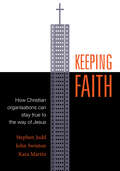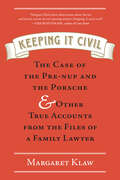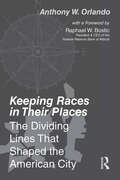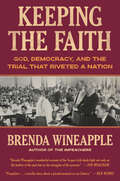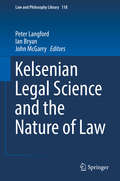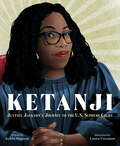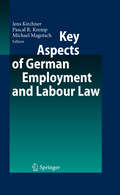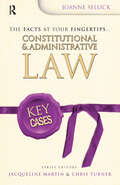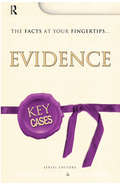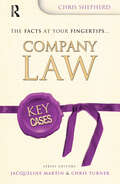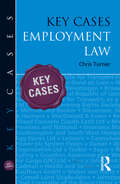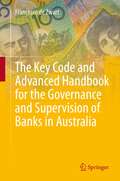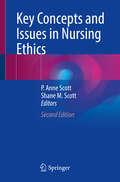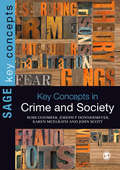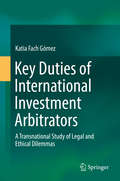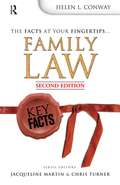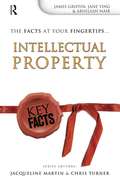- Table View
- List View
The Keeper: A Novel (Dismas Hardy #15)
by John LescroartFrom New York Times bestselling author John Lescroart, a riveting novel featuring Dismas Hardy and Abe Glitsky on the hunt for clues about a woman who has gone missing.On the evening before Thanksgiving, Hal Chase, a guard in the San Francisco County Jail, drives to the airport to pick up his step-brother for the weekend. When they return, Hal's wife, Katie, has disappeared without a clue. By the time Dismas Hardy hears about this, Katie has been missing for five days. The case strikes close to home because Katie had been seeing Hardy's wife, a marriage counselor. By this time, the original Missing Persons case has become a suspected homicide, and Hal is the prime suspect. And the lawyer he wants for his defense is none other than Hardy himself. Hardy calls on his friend, former homicide detective Abe Glitsky, to look into the case. At first it seems like the police might have it right; the Chases' marriage was fraught with problems; Hal's alibi is suspect; the life insurance policy on Katie was huge. But Glitsky's mission is to identify other possible suspects, and there proves to be no shortage of them: Patti Orosco--rich, beautiful, dangerous, and Hal's former lover; the still unknown person who had a recent affair with Katie; even Hal's own step-mother Ruth, resentful of Katie's gatekeeping against her grandchildren. And as Glitsky probes further, he learns of an incident at the San Francisco jail, where Hal works--only one of many questionable inmate deaths that have taken place there. Then, when Katie's body is found not three blocks from the Chase home, Homicide arrests Hal and he finds himself an inmate in the very jail where he used to work, a place full of secrets he knows all too well. Against this backdrop of conspiracy and corruption, ambiguous motives and suspicious alibis, an obsessed Glitsky closes in on the elusive truth. As other deaths begin to pile up he realizes, perhaps too late, that the next victim might be himself.
Keeping Faith: How Christian Organisations Can Stay True to the Way of Jesus
by Stephen Judd John Swinton Kara MartinWe all can think of organisations that were established by Christians that are no longer recognisably Christian. In Keeping Faith, the authors outline the key components of organisational faithfulness – that is, what is needed for Christian organisations to stay true to the way of Jesus. They argue that the old reliance on statements of faith, or a set of Christian values, is insufficient. What is needed is a robust organisational theology that inhabits the enterprise’s structures, management, business policies, practices and relationships and is tailored to the purpose of the organisation.In this important book, you will find: a checklist to determine if your organisation is losing its faithfulness; an outline of some key components of organisational theology; examples, both positive and negative, of theological application in organisations; discussion questions for organisational reflection.With combined global experience in practical theology, running businesses and charities, and integrating faith and work, Judd, Swinton and Martin have created an important and essential book for every Christian organisation.
Keeping Faith with Nature: Ecosystems, Democracy, and America's Public Lands
by Robert B. KeiterAs the twenty-first century dawns, public land policy is entering a new era. This timely book examines the historical, scientific, political, legal, and institutional developments that are changing management priorities and policies--developments that compel us to view the public lands as an integrated ecological entity and a key biodiversity stronghold. Once the background is set, each chapter opens with a specific natural resource controversy, ranging from the Pacific Northwest's spotted owl imbroglio to the struggle over southern Utah's Colorado Plateau country. Robert Keiter uses these case histories to analyze the ideas, forces, and institutions that are both fomenting and retarding change. Although Congress has the final say in how the public domain is managed, the public land agencies, federal courts, and western communities are each playing important roles in the transformation to an ecological management regime. At the same time, a newly emergent and home-grown collaborative process movement has given the public land constituencies a greater role in administering these lands. Arguing that we must integrate the new imperatives of ecosystem science with our devolutionary political tendencies, Keiter outlines a coherent new approach to natural resources policy.
Keeping It Civil: The Case of the Pre-nup and the Porsche & Other True Accounts from the Files of a Family Lawyer
by Margaret KlawProvocative true cases that explore the intersection of our most intimate relationships and the law—and offer a window into how we define a family today.A woman seeking a divorce has no idea of the family finances—her husband doled out money only after she gave him requisition slips for her intended purchases. A lesbian couple wants to include their sperm donor in their child’s life—the sperm donor is the brother of one partner, so he will be the biological father as well as the child’s uncle. These are the clients who come knocking on family lawyer Margaret Klaw’s door, hoping for resolution.
Keeping Promises: The Royal Proclamation of 1763, Aboriginal Rights, and Treaties in Canada
by Jim Aldridge Terry FengeIn 1763 King George III of Great Britain, victorious in the Seven Years War with France, issued a proclamation to organize the governance of territory newly acquired by the Crown in North America and the Caribbean. <P><P> The proclamation reserved land west of the Appalachian Mountains for Indians, and required the Crown to purchase Indian land through treaties, negotiated without coercion and in public, before issuing rights to newcomers to use and settle on the land. Marking its 250th anniversary Keeping Promises shows how central the application of the Proclamation is to the many treaties that followed it and the settlement and development of Canada. Promises have been made to Aboriginal peoples in historic treaties from the late eighteenth to the early twentieth centuries in Ontario, the Prairies, and the Mackenzie Valley, and in modern treaties from the 1970s onward, primarily in the North. In this collection, essays by historians, lawyers, treaty negotiators, and Aboriginal leaders explore how and how well these treaties are executed. Addresses by the governor general of Canada and the federal minister of Aboriginal Affairs and Northern Development are also included. In 2003 Aboriginal leaders formed the Land Claims Agreements Coalition to make sure that treaties - building blocks of Canada - are fully implemented. Unique in breadth and scope, Keeping Promises is a testament to the research, advocacy, solidarity, and accomplishments of this coalition and those holding the Crown to its commitments.
Keeping Races in Their Places: The Dividing Lines That Shaped the American City
by Anthony W. Orlando"A book perfect for this moment" –Katherine M. O’Regan, Former Assistant Secretary, US Department of Housing and Urban Development More than fifty years after the passage of the Fair Housing Act, American cities remain divided along the very same lines that this landmark legislation explicitly outlawed. Keeping Races in Their Places tells the story of these lines—who drew them, why they drew them, where they drew them, and how they continue to circumscribe residents’ opportunities to this very day. Weaving together sophisticated statistical analyses of more than a century’s worth of data with an engaging, accessible narrative that brings the numbers to life, Keeping Races in Their Places exposes the entrenched effects of redlining on American communities. This one-of-a-kind contribution to the real estate and urban economics literature applies the author’s original geographic information systems analyses to historical maps to reveal redlining’s causal role in shaping today’s cities. Spanning the era from the Great Migration to the Great Recession, Keeping Races in Their Places uncovers the roots of the Black-white wealth gap, the subprime lending crisis, and today’s lack of affordable housing in maps created by banks nearly a century ago. Most of all, it offers hope that with the latest scholarly tools we can pinpoint how things went wrong—and what we must do to make them right.
Keeping the Faith: God, Democracy, and the Trial That Riveted a Nation
by Brenda Wineapple&“Brenda Wineapple&’s wonderful account of the Scopes trial sheds light not only on the battles of the past but on the struggles of the present.&”—Jon Meacham &“History at its most delicious.&”—The New York Times Book Review (front page review, Editors&’ Choice)The dramatic story of the 1925 Scopes trial, which captivated the nation and exposed profound divisions in America that still resonate today—divisions over the meaning of freedom, religion, education, censorship, and civil liberties in a democracy &“Propulsive . . . a terrific story about a pivotal moment in our history.&”—Ken Burns&“No subject possesses the minds of men like religious bigotry and hate, and these fires are being lighted today in America.&” So said legendary attorney Clarence Darrow as hundreds of people descended on the sleepy town of Dayton, Tennessee, for the trial of a schoolteacher named John T. Scopes, who was charged with breaking the law by teaching evolution to his biology class in a public school.Brenda Wineapple, the award-winning author of The Impeachers, explores how and why the Scopes trial quickly seemed a circus-like media sensation, drawing massive crowds and worldwide attention. Darrow, a brilliant and controversial lawyer, said in his electrifying defense of Scopes that people should be free to think, worship, and learn. William Jennings Bryan, three-time Democratic nominee for president, argued for the prosecution that evolution undermined the fundamental, literal truth of the Bible and created a society without morals, meaning, and hope.In Keeping the Faith, Wineapple takes us into the early years of the twentieth century—years of racism, intolerance, and world war—to illuminate, through this pivotal legal showdown, a seismic period in American history. At its heart, the Scopes trial dramatized conflicts over many of the fundamental values that define America, and that continue to divide Americans today.
The Kefaya Movement
by Nadia Oweidat Walid Kildani Cheryl Benard Dale Stahl Edward O'ConnellKefaya was an indigenous movement for political reform organized in late2004 in opposition to the regime of Egyptian President Hosni Mubarak. Thisexamination of Kefaya's birth, accomplishments, and decline is based on ananalysis of the work of Egyptian scholars and Arabic-language media reports(including online and new media), as well as structured interviews withpersons associated with and observers of Kefaya and the Muslim Brotherhood.
Kelsenian Legal Science and the Nature of Law
by Peter Langford Ian Bryan John McgarryThis book critically examines the conception of legal science and the nature of law developed by Hans Kelsen. It provides a single, dedicated space for a range of established European scholars to engage with the influential work of this Austrian jurist, legal philosopher, and political philosopher. The introduction provides a thematization of the Kelsenian notion of law as a legal science. Divided into six parts, the chapter contributions feature distinct levels of analysis. Overall, the structure of the book provides a sustained reflection upon central aspects of Kelsenian legal science and the nature of law. Parts one and two examine the validity of the project of Kelsenian legal science with particular reference to the social fact thesis, the notion of a science of positive law and the specifically Kelsenian concept of the basic norm (Grundnorm). The next three parts engage in a critical analysis of the relationship of Kelsenian legal science to constitutionalism, practical reason, and human rights. The last part involves an examination of the continued pertinence of Kelsenian legal science as a theory of the nature of law with a particular focus upon contemporary non-positivist theories of law. The conclusion discusses the increasing distance of contemporary theories of legal positivism from a Kelsenian notion of legal science in its consideration of the nature of law.
Kemper V. Nita City Cubs Holdings, Inc: Case File (Nita Ser.)
by Theresa MooreIn Kemper v. Nita City Cubs Holdings, Inc.,what began as a fun afternoon at the ballpark turned into a nightmare for a baseball patron and a lawsuit for the Nita City Cubs organization. The plaintiff, Jessica Kemper, sued the baseball stadium for injuries caused by an allegedly intoxicated fan at a game. Kemper alleged violations of the Nita Dram Shop Act and negligence. Kemper was looking forward to a baseball game with her children at Hannigan Field, home of the Nita City Cubs. What she got instead was a trip to the emergency room, several stitches, and a lawsuit for the damages she incurred. A fellow sports fan, arguably intoxicated, threw a small bat he was given as part of the Souvenir Bat Giveaway promotion and struck Kemper in the back of the head. Was this a simple case of drunken behavior, or an example of systemic, irresponsible revelry sanctioned, and even encouraged, by the Cubs organization? Did the Cubs sacrifice safety and security to drive up "fun" at the park for all the wrong people? Either side can make a compelling case given the exhibits, testimony, and witnesses. Kemper v. Nita City Cubs, the second in Theresa D. Moore's Trial by Fire legal case series, refines the student's advocacy and examination skills through this full trial, which includes two to four witnesses per side, mini depositions, and modern electronic evidence in the form of emails, Tweets, and photo-sharing posts that are accessible on online "microsites." The case series focuses on storytelling as it relates to presenting factual information to judges and juries. Kemper is well balanced and can be won by either side. It has substantial evidentiary depth, which allows the students varying options of strategy and creativity for those who meet the challenge and see the hidden gems in the facts. These cases, by their facts and evidence, are meant to inspire the imagination of the students, challenge them, and give them the will and desire to fight for their cause. Kemper features true-to-life evidence, documents, and situations, and is professor friendly, with teaching notes available. And, the Nita City Cubs souvenir bat, physical evidence in the case, is also available for purchase.
Kennedy's Avenger: Assassination, Conspiracy, and the Forgotten Trial of Jack Ruby
by Dan Abrams David FisherNew York Times bestselling authors Dan Abrams and David Fisher bring to life the incredible story of one of America’s most publicized—and most surprising—criminal trials in history.No crime in history had more eyewitnesses. On November 24, 1963, two days after the killing of President Kennedy, a troubled nightclub owner named Jack Ruby quietly slipped into the Dallas police station and assassinated the assassin, Lee Harvey Oswald. Millions of Americans witnessed the killing on live television, and yet the event would lead to questions for years to come.It also would help to spark the conspiracy theories that have continued to resonate today.Under the long shadow cast by the assassination of America’s beloved president, few would remember the bizarre trial that followed three months later in Dallas, Texas. How exactly does one defend a man who was seen pulling the trigger in front of millions? And, more important, how did Jack Ruby, who fired point-blank into Oswald live on television, die an innocent man?Featuring a colorful cast of characters, including the nation’s most flamboyant lawyer pitted against a tough-as-Texas prosecutor, award-winning authors Dan Abrams and David Fisher unveil the astonishing details behind the first major trial of the television century. While it was Jack Ruby who appeared before the jury, it was also the city of Dallas and the American legal system being judged by the world.
Kentucky Driver Manual
by Kentucky State PoliceThe Kentucky Drivers Manual has been prepared by the Kentucky State Police to provide you with the knowledge and basic skills to become a safe and courteous driver. By thoroughly studying this manual, you will develop good driving habits and a better understanding the traffic laws of Kentucky. It should be your goal to learn everything you can before starting your driving career. By committing yourself to this goal, you will in turn make the roadways of Kentucky safer for everyone.
Ketanji: Justice Jackson's Journey to the U.S. Supreme Court
by Kekla MagoonFrom two Coretta Scott King Honor winners comes this uplifting picture book biography about Ketanji Brown Jackson, who is making history as the first Black woman to serve as a Supreme Court Justice.Ketanji Brown Jackson is no stranger to overcoming obstacles. When a high school guidance counselor told her she should set her sights lower than Harvard, she decided to go to Harvard for college and law school.When she became a public defender and saw inequalities in the justice system, she used her legal skills to advocate for people who needed help, but couldn’t afford an attorney.Ketanji’s path to the Supreme Court was unique: She’s the only current Justice to have been a public defender and one of a few who went to public school. Her story is powerful and heartening, and it’s a lesson in overcoming adversity by being true to yourself.Margaret A. Edwards Award winner, Printz Honor winner, and National Book Award finalist Kekla Magoon and Coretta Scott King honoree Laura Freeman reunite to present a generation of readers with a new inspirational figure.
Key Aspects of German Employment and Labour Law
by Jens Kirchner Pascal R. Kremp Michael MagotschThis publication gives an overview of all key aspects of German labour and employment law as well as adjoining fields. Legal professionals with expert knowledge and many years of experience explain the legal basis of these aspects of German law, point out typical practical problems and suggest solutions to those problems. In addition, examples are given on how to best manage legal pitfalls to minimize risks. This book translates employment and labour law for foreign in-house counsels and human resources managers at international companies and provides a clear understanding of the complex legal regulations in Germany. All three editors of the book, Dr. Jens Kirchner, Pascal R. Kremp and Michael Magotsch, are key legal professionals working at the Frankfurt office of DLA Piper, one of the largest legal services providers in the world (www.dlapiper.com), with national and multinational clients. Their experience includes the management of cross-border restructurings, outsourcing and transfer of undertaking measures, as well as the management of national and multi-jurisdictional merger and acquisitions projects, including post-merger integration processes.
Key Aspects of German Employment and Labour Law
by Jens Kirchner Pascal R. Kremp Michael MagotschThis publication gives an overview of all key aspects of German labour and employment law as well as adjoining fields. Legal professionals with expert knowledge and many years of experience explain the legal basis of these aspects of German law, point out typical practical problems and suggest solutions to those problems. In addition, examples are given on how to best manage legal pitfalls to minimize risks. This book translates employment and labour law for foreign in-house counsels and human resources managers at international companies and provides a clear understanding of the complex legal regulations in Germany. All three editors of the book, Dr. Jens Kirchner, Pascal R. Kremp and Michael Magotsch, are key legal professionals working at the Frankfurt office of DLA Piper, one of the largest legal services providers in the world (www. dlapiper. com), with national and multinational clients. Their experience includes the management of cross-border restructurings, outsourcing and transfer of undertaking measures, as well as the management of national and multi-jurisdictional merger and acquisitions projects, including post-merger integration processes.
Key Cases: Constitutional and Administrative Law (Key Cases)
by Joanne ColesKey Cases is the essential series for anyone studying law, including A Level, LLB, ILEX and post-graduate conversion courses. Understanding and memorising leading cases fully is a vital part of the study of law - the clear format, style and explanations of Key Cases will ensure you achieve this.Key Cases provides the simplest and most effective way for you to memorise and absorb the essential cases needed to pass your exams.Key Features:* All essential and leading cases explained* User-friendly layout and style* Cases broken down into key components by use of a clear symbol systemAdditional high-quality revision material is provided on the interactive website:www.unlockingthelaw.co.uk
Key Cases: Evidence (Key Cases)
by Beverley Hopkins Emma WashbourneKey Cases has been specifically written for students studying law. It is an essential revision tool to be used alone or with the partner Key Facts book in order to ensure a thorough knowledge of core cases for any given law topic.Understanding essential and leading cases fully is a vital part of the study of law - the format, style and explanations of Key Cases will ensure you have this understanding.The series is written and edited by an expert team of authors whose experience means they know exactly what is required in a revision aid. They include lecturers and barristers, who have brought their expertise and knowledge to the series to make it user-friendly and accessible.Key features include: essential and leading cases explained; user-friendly layout and style; cases broken down into key components by use of clear symbol system; pocket-sized and easily portable; highly-regarded authors and editors.
Key Cases: Company Law (Key Cases)
by Christopher ShepherdKey Cases is the essential series for anyone studying law, including A Level, LLB, ILEX and post-graduate conversion courses. Understanding and memorising leading cases fully is a vital part of the study of law - the clear format, style and explanations of Key Cases will ensure you achieve this. Key Cases provides the simplest and most effective way for you to memorise and absorb the essential cases needed to pass your exams. Key Features: * All essential and leading cases explained * User-friendly layout and style * Cases broken down into key components by use of a clear symbol system Additional high-quality revision material is provided on the interactive website: www.unlockingthelaw.co.uk
Key Cases: Key Cases: Employment Law (Key Cases)
by Chris TurnerKey Cases is the essential companion for anyone studying undergraduate law, including LLB, ILEX and post-graduate conversion courses.Key Cases breaks down the case law into recognisable and memorable elements, including the key facts, key law, key principles, key judgments, key comments and key problems as appropriate in each case. Diagrams that summarise the key points are included at the start of each chapter. New to these editions is an improved text design making the books easier read and the facts easier to retain.Key Cases books are supported by the website www.unlockingthelaw.co.uk where you will find extensive revision materials.
The Key Code and Advanced Handbook for the Governance and Supervision of Banks in Australia
by Francesco de ZwartThis Key Code and Handbook examines the corporate governance and accountability of Major Banks, their directors and executives which were the central focus of bank, Supervisor, Regulator and governmental activity and public scrutiny in 2018 and 2019. This book explores this responsibility focus by providing evidence from the Global Financial Crisis and beyond with both APRA and ASIC investigating illegal conduct, misconduct and conduct which was below the level of community expectations. This book discusses how the Royal Commission into misconduct in the banking and financial services industry has already given rise to a detailed Final Report whose recommendations are still being put into effect. Further, this book uses evidence provided by the large number of Prudential Standards issued by APRA and investigations into the conduct of Major Banks by Regulators. This book explores governance variables – over 1,700 in number and grouped into 159 ‘key groupings’ or separate categories – which are all indexed to 28 governmental, regulatory and supervisory reports and documents to create a governance code and commentary specifically tailored to Australian banks. Each governance variable is modelled on the Stage 1 Relational Approach contained in Enhancing Firm Sustainability Through Governance. Given the huge interest in the governance of banks, Parts 1 and 2 – explaining the Relational Approach - of Stage 1 were recently published in November 2018 and June 2019 in the Australian Journal of Corporate Law. This book is the largest reference book and handbook in publication worldwide containing the structures, mechanisms, processes and protocols – the checks and balances we call ‘governance variables’ – that deeply addresses and explains banking accountability and regulation in Australia.
Key Concepts and Issues in Nursing Ethics
by P. Anne Scott Shane M. ScottThis second edition offers updates, new topics, and new short case studies, based on real stories from the health care arena, ensuring that each chapter of this book is rooted in descriptions of nursing practise that are grounded, salient narratives of nursing care. The reader is assisted to explore the ethical dimension of nursing practice: what it is and how it can be portrayed, discussed, and analysed within a variety of practice and theoretical contexts. One of the unique contributions of this book is to consider nursing not only in the context of the individual nurse – patient relationship but also as a social good that is of necessity limited, due to the ultimate limits on the nursing and health care resource. This book will help the reader consider what good nursing looks like, both within the context of limitations on resources, during crises situations, and under conditions of scarcity. Indeed, any discussion of ethical issues in nursing should be well grounded in aconceptualisation of nursing that nursing students and practising nursing can recognise, accept and engage with. Nursing, like medicine, social work and teaching has a clear moral aim – to do good. In the case of nursing to do good for the patient. However it is vital that in the pressurised, constrained, post-COVID-19 pandemic health service of the 21st century, we help nurses explore what this might mean for nursing practice and what can reasonably be expected of the individual nurse, and the nursing profession, in terms of good nursing care.
Key Concepts in Crime and Society (SAGE Key Concepts series)
by John Scott Ross Coomber Joseph F. Donnermeyer Karen McElrathKey Concepts in Crime and Society offers an authoritative introduction to key issues in the area of crime as it connects to society. By providing critical insight into the key issues within each concept as well as highlighted cross-references to other key concepts, students will be helped to grasp a clear understanding of each of the topics covered and how they relate to broader areas of crime and criminality. The book provides an up-to-date, critical understanding on a wide range of crime related topics covering the major concepts students are likely to encounter within the fields of sociology, criminology and across the social sciences.
Key Duties of International Investment Arbitrators: A Transnational Study of Legal and Ethical Dilemmas
by Katia Fach GómezThis book critically analyses how arbitration cases, institutional rules and emerging codes of conduct in the international arbitration sector have dealt with a series of key arbitrator duties to date. In addition, it offers a range of feasible and well-grounded proposals regarding investment arbitrators’ duties in the future. The following aspects are examined in depth: the duty of disclosurethe duty to investigatethe duty of diligence and integrity, which in turn may be divided into temporal availability, a non-delegation of responsibilities, and adhering to appropriate behaviourthe duty of confidentiality, andother duties such as monitoring arbitration costs, or continuous training. Investment arbitration is currently undergoing sweeping changes. The EU proposal to create a Multilateral Investment Court incorporates a number of ground-breaking developments with regard to arbitrators. Whether this new model of permanent “members of the court” will ever become a reality, or whether the classical ex-parte arbitrator system will manage to retain its dominance in the investment arbitration milieu, this book is based on the assumption that there is a current need to re-examine and rethink the main duties of investment arbitrators. Apart from being the first monograph to analyse these duties in detail, the book will spark a crucial debate among international scholars and practitioners. It is essential to identify arbitrators’ duties and find consensus on how they should be reshaped in the near future, so that these central figures in investment arbitration can reinforce the legitimacy of a system that is currently in crisis.
Key Facts: Key Facts: Family Law (Key Facts)
by Helen L ConwayKey Facts has been specially written for students studying law. It is the essential revision tool for a broad range of law courses. The series is written and edited by an expert team of authors whose experience means they know exactly what is required in a revision aid. They include examiners, barristers and lecturers who have brought their expertise and knowledge to the series to make it user-friendly and accessible. Key features include: user-friendly layout and style; diagrams, charts and tables to illustrate key points; summary charts at a basic level, followed by more detailed explanations, to aid revision at every level, pocket sized and easily portable; highly-regarded authors.
Key Facts: Intellectual Property
by James Griffin Ying JinKey Facts has been specially written for students studying law. It is the essential revision tool for a broad range of law courses. The series is written and edited by an expert team of authors whose experience means they know exactly what is required in a revision aid. They include examiners, barristers and lecturers who have brought their expertise and knowledge to the series to make it user-friendly and accessible. Key features include: user-friendly layout and style; diagrams, charts and tables to illustrate key points; summary charts at a basic level, followed by more detailed explanations, to aid revision at every level, pocket sized and easily portable; highly-regarded authors.

